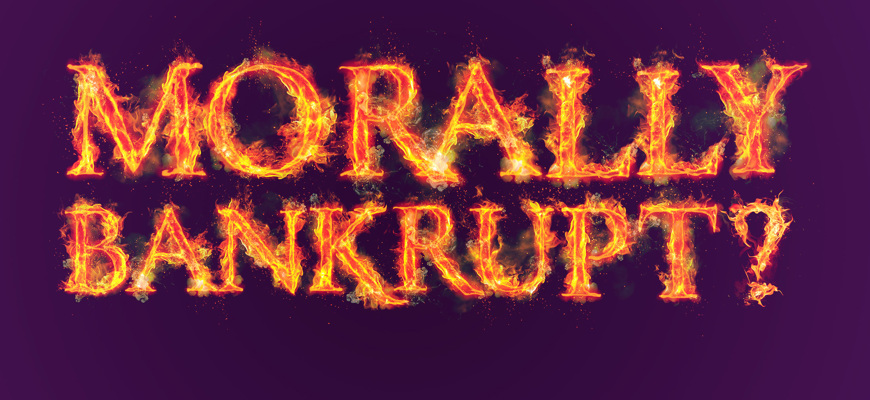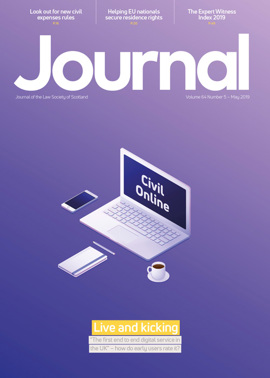Morally bankrupt?

In Scottish Legal News recently, Douglas Mill let rip a howl of outrage that a number of hitherto prominent law firms had bitten the dust over the last few years. He sees in their demise not just evidence of poor judgment, but immorality.
Where, he asks, giving his tub an almighty thump, is the “black burning shame” of the partners responsible, who leave creditors unpaid and staff without jobs, while they “concentrate on launching their own lifeboats?” What damage they have done to the profession’s reputation? Douglas is a Mill who grinds ferociously. He seems to question the character not just of individuals, but of modern lawyers generally. “Am I”, he asks, “the last dinosaur who believes that for solicitors, there is a moral dimension to money?”
I share his sympathy for insolvency’s victims – less for the banks, who charge handsome rates of interest for the risks they know they are taking, than for the staff for whom redundancy is devastating, and for suppliers damaged by bills never paid. But with respect, a little nuance wouldn’t go amiss.
To answer Mill’s second question directly, no he isn’t. The overwhelming majority of lawyers demonstrate daily by their words and actions that good morals matter in all things, not just money. This is nothing to do with being a dinosaur. It is about being a decent human being – and an astute one. Good morality is also good business. Without trust, we have nothing. Paragons we are not, as capable of hubris, selfishness, intemperance and incompetence as the next person. Still, most of the time we are able to look ourselves in the mirror without wincing.
Failure, but why?
In general, is there a moral dimension to law firm insolvency? Should solicitors who go bust be put in specially erected stocks outside the sheriff court, where they can be pelted by the local faculty, until “black, burning shame” engulfs them? Actually, no. There is no necessary link between business failure and moral failure. Few of us set out to fail, or do harm. For sure, there has been bad behaviour on the bridge as ships have gone down, but I have also seen how hard people have fought to save their ships and their crew.
And when the battle is lost, finding a role elsewhere does not mean a free pass. The personal cost can be massive. Losing reputation and self-worth is often more devastating than the loss of capital and income. Explaining the consequences of insolvency to family and colleagues is one of life’s most painful experiences. I have also seen close-up the decency of acquiring firms. Yes, they are businesses, not charities, but typically, their gut instinct has been to go the extra mile to avoid hardship.
It is right that actions should have consequences. If leaders have made bad decisions, they deserve criticism, and to pay the price. But crystal balls are a scarce commodity. We live in an uncertain world. Decisions which look terrible in hindsight – for example, to take on an expensive building – may have looked reasonable at the time. Life happens. The recession was seismic. Today, the economic doldrums caused by Brexit have skewered many a forecast. Clever people are not immune to mistakes. Luck plays a much bigger part in our lives than we like to think.
Rising again
I also believe in the power of redemption. “I am not concerned that you have fallen,” said Abraham Lincoln, “but that you arise.” One of the reasons why the US is the world’s most successful economy is that there is less stigma attached to business failure. Some of its greatest entrepreneurs fell flat on their faces at the first, or even the second attempt.
Have these insolvencies damaged the profession’s reputation, as Mill suggests? A little, probably, but we should not exaggerate. There is no good evidence that clients trust their lawyers less than they used to. What matters to them is performance and results. Accountancy’s reputation has been damaged far more by the shortcomings of the Big Four’s audit operations.
In the blame game there are only losers. Thoughtful leaders will respond to these insolvencies not with Schadenfreude, but by learning from them (it’s not as if the lessons are difficult, or a well-kept secret), investing in the management and strategic skills of their people, and creating for themselves a network they trust to give wise counsel and challenge their assumptions.
But nothing is risk-free. There is no guarantee that history will not repeat itself. I respect Douglas Mill’s concerns, and his passion for the profession. But in conflating two entirely different things, and pointing the finger, without offering solutions, I’m sorry to say he risks not only grinding, but grating.
In this issue
- Claiming under the advance payment scheme
- Time for a written constitution
- New form F9: worth the wait?
- Wedded to a matrimonial property regime
- Brexit divorce set to increase UK's “skype families”
- Corporate personality: Justice v Doctrine
- Reading for pleasure
- The Law Society of Scotland Expert Witness Index 2019
- Opinion: Judith Robertson
- Book reviews
- Profile: Michael Clancy
- President's column
- Is your legal data being held to ransom?
- People on the move
- Sign up – log in – action!
- Frozen out?
- Taxing times for litigators
- DNA analysis: when research just isn’t enough
- Brexit focus: EU citizen settlement remedies
- Why employers should report on wellbeing
- 3% – and then what?
- 1,000 days of mediation
- Barred from acting
- To name or not to name?
- Enter the “What I Think”
- Fixed penalties and fair trials
- Auto-enrolment: keeping employers on their toes
- Scottish Solicitors' Discipline Tribunal
- Vulnerable accused: a need for knowledge
- Burdens and who can enforce them
- Convener’s final bow
- Public policy highlights
- TCSP review update
- Westminster: answering the call
- Accredited paralegal practice area highlight: family law
- Accredited Paralegal Committee profile
- Nyona named star paralegal
- Ask Ash
- Moving nightmares part 2
- Complaints: seeking consistent practice
- Morally bankrupt?
- For the elderly: how SFE works
- Standing up to challenge






